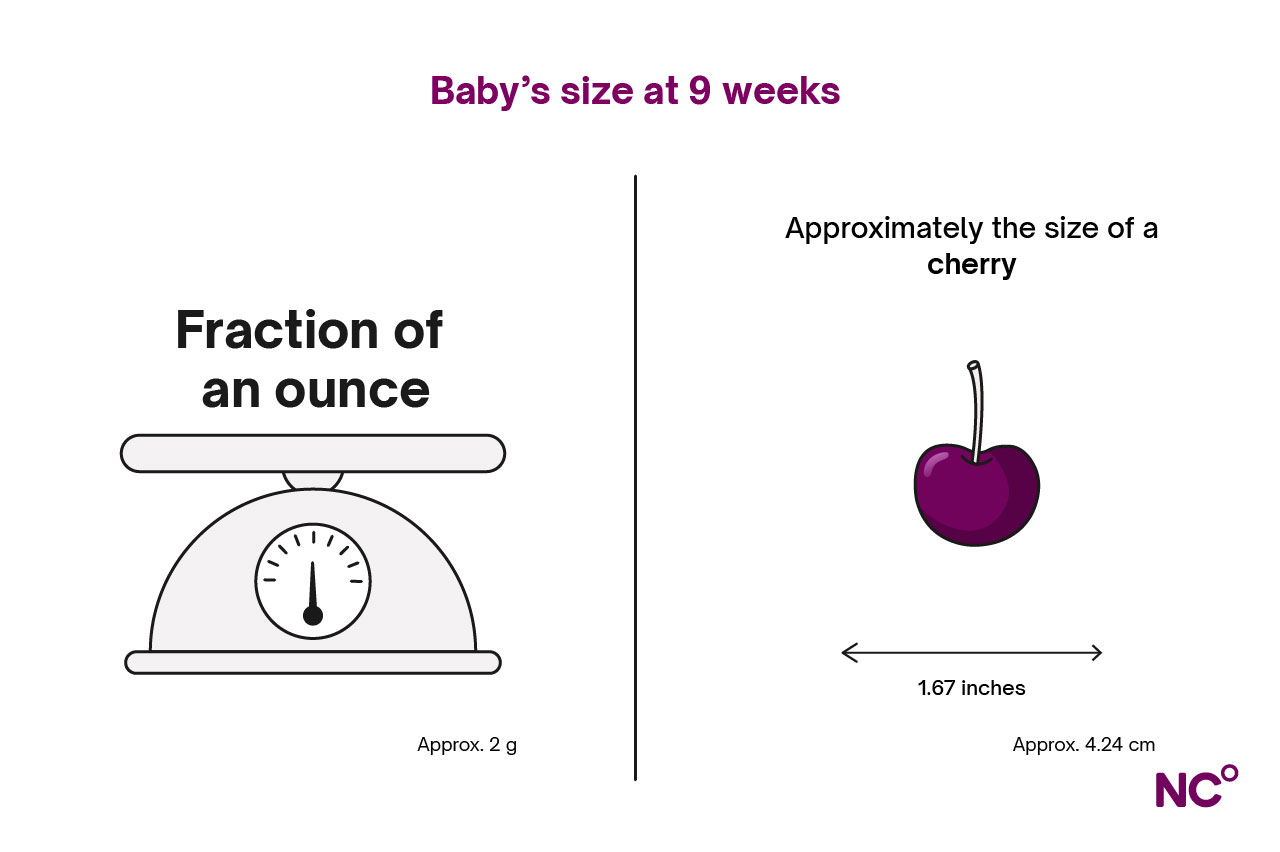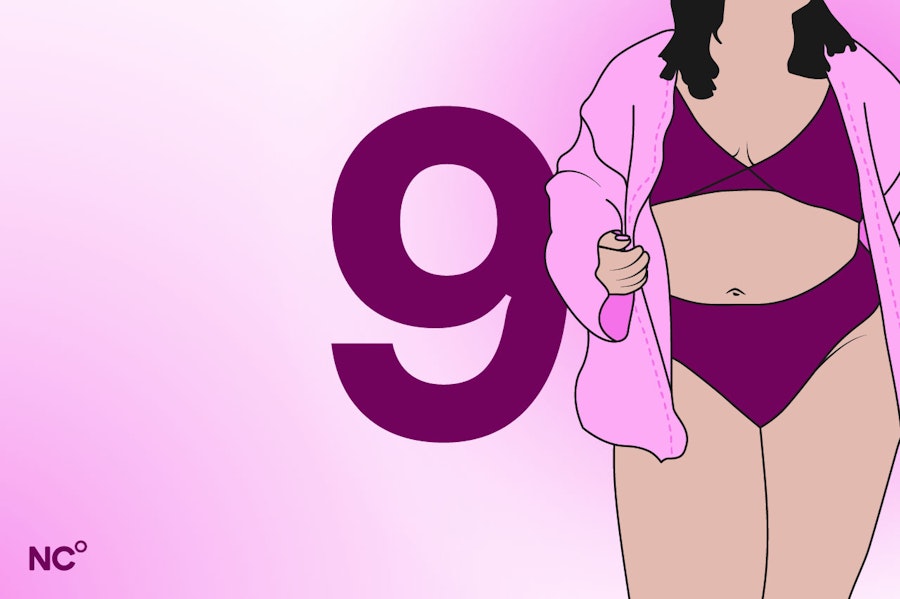9 Weeks pregnant: Pregnancy symptoms & tips
Follows NC° Editorial Policy
At Natural Cycles, our mission is to empower you with the knowledge you need to take charge of your health. At Cycle Matters, we create fact-checked, expert-written content that tackles these topics in a compassionate and accessible way. Read more...
Key takeaways
- At 9 weeks pregnant, your pregnancy is well underway — and symptoms like nausea, food cravings, and heartburn may be, too
- No longer considered an embryo, your baby has officially become a fetus, which marks the start of a whole new stage of development
- Now is a great time to focus on rest and nutrition, and learn more about things like prenatal testing and pelvic floor exercises
As you reach week 9, your pregnancy is gaining momentum. Your little one is transitioning from embryo to fetus and continuing to develop key features and organs [1]. At the same time, your body is adapting to meet new demands, likely leaving you with a range of early pregnancy symptoms. Whether you’re navigating nausea, heartburn, or emotional ups and downs, remember that this is a time of remarkable growth and change. Being kind and patient with yourself is essential — your body is working overtime to support and nurture this new life.
Pregnancy symptoms at week 9
By week 9 of pregnancy, classic first-trimester symptoms like nausea and food aversions may be in full swing. While these symptoms can be challenging, take heart — relief might be on the way. Early pregnancy symptoms like morning sickness are likely to ease up by the start of the second trimester (or even sooner)[2].
Heartburn: Feeling the heat? Pregnancy hormones relax the muscle that keeps stomach acid down, which can lead to that familiar burning sensation. If heartburn is bothering you, try eating smaller meals, avoiding spicy or fatty foods, and waiting a while before lying down after eating. You can also ask your pharmacist about safe antacids — just be sure to mention you’re pregnant, as some aren’t recommended during pregnancy [3, 4].
Morning sickness: That queasy, sick-to-your-stomach feeling is a hallmark of the first trimester. It is estimated that roughly 7 in 10 pregnant people experience morning sickness, and even though it’s called “morning” sickness, it can strike at any time of day [5].
If your symptoms become more severe, especially if you can’t keep liquids down, it’s important to reach out to your healthcare provider. This could be a sign of hyperemesis gravidarum (HG), a more serious form of pregnancy-induced nausea and vomiting, that may need medical attention [6, 7].
Food cravings and aversions: Craving pickles at 10 a.m.? Can’t stand the smell of your favorite coffee? You’re in good company, as these appetite changes are one of the most common symptoms of early pregnancy. In addition to craving certain foods and feeling nauseated by others, you may feel sensitive to certain smells or notice an odd or metallic taste in your mouth. Go ahead and enjoy those cravings in moderation, and don’t force yourself to eat anything that disagrees with your appetite [8, 9].
Constipation: By week 9 of pregnancy, you may be feeling uncomfortably ‘backed up.’ Be sure to drink lots of water and prioritize foods that are rich in fiber, including fruits, vegetables, beans, lentils, and high-fiber cereals. Staying active with gentle movement can also help keep things regular [10].
Your baby’s development at week 9
At 9 weeks of pregnancy, your baby has transitioned from an embryo to a fetus, marking a significant milestone in development. About the size of a grape, your fetus is undergoing rapid growth and refinement of vital structures at this time [3, 1].
Organ development: It may be surprising given your little one’s size, but by week 9, all of the fetus’ essential organs are well on their way to forming. (In fact, by week 12, most of the baby’s major organs are structurally in place, though they will continue to grow and mature throughout pregnancy). These include tiny lungs that will eventually carry air, and a rapidly developing brain that’s laying the foundation for future thinking, moving, and sensing [11, 12].
Teeth, nipples, and eyelids: Tiny nipples are starting to appear, and little buds for future teeth are forming. Your baby’s eyelids are formed but fused shut for now [3, 12].
Tiny movements: All of the fetus’ little joints — knees, elbows, shoulders, ankles, and wrists — are forming and starting to bend, which means they can move around freely inside the amniotic sac. You won’t feel it yet, but your baby is already practicing kicks, stretches, and wiggles [3].
Your baby’s size at week 9: Your baby measures just over 1.5 inches and is about the size of a cherry [3].

Are you supposed to be showing at 9 weeks?
Nope! Due to your baby’s size and the position of your uterus, your baby bump probably isn’t visible yet. Most pregnant people start to show their pregnancy toward the end of the first trimester or the beginning of the second trimester.
However, the answer isn’t one-size-fits-all. Every pregnancy is unique, and the timing of a visible bump can depend on factors like body composition, genetics, how many babies you’re carrying, and whether or not this is your first pregnancy. First pregnancies often take longer to show because abdominal muscles are often “stretched” from a first pregnancy [13].
It’s also common to feel bloated during this time (thanks to hormonal changes and slowed digestion) which can leave you feeling puffed up at the belly. If you’re eager to sport a baby bump, don’t worry — it will appear in its own time. And soon enough, it will be hard to ignore [1, 14]!
Tips for 9 weeks pregnant
Eat well, drink plenty: Nourishing and hydrating your body is more important than ever. Whole foods like folate-packed greens, iron-rich beans, and lean proteins support your body, while water keeps symptoms like fatigue and constipation at bay [15].
Ease morning sickness: Try eating small, frequent meals to help reduce nausea. Simple carbs like toast, crackers, or plain rice can be easier on your stomach, while natural remedies like ginger tea can help ease nausea (check out our guide on pregnancy-safe teas to learn more)[16, 17].
Keep moving: Light activity (such as walking, stretching, or prenatal yoga) is great for your physical and mental health. Movement can also help with energy, sleep, and bloating. Make sure your doctor gives you the green light first. Learn more about exercise during pregnancy.
Wear comfortable clothes: Pregnancy brings all kinds of changes — bloating, weight gain, and soon enough, a growing bump — so comfort matters more than ever. Choose soft, stretchy clothing that moves with you, doesn’t pinch or restrict your growing belly, and keeps you feeling comfortable and supported throughout the day.
Prioritize rest and self-care: Your body is doing a lot right now, so don’t underestimate the power of rest. Whether it’s going to bed earlier, sneaking in a nap, or clearing your schedule, give yourself permission to slow down. Your mental well-being matters too — try short meditations, journaling, or just a few quiet minutes to reset.
Keep up with prenatal vitamins and pregnancy-safe behaviors: As your pregnancy progresses, it’s important to take your prenatal vitamins consistently and follow the guidelines that support a healthy pregnancy. When it comes to prenatal vitamins, it’s recommended to take 400 mcg of folic acid daily until at least week 12 to support your baby’s development. Depending on how much sunlight exposure you get where you live, vitamin D is also recommended in your prenatal. In terms of pregnancy-safe behaviors, these include abstaining from drinking alcohol, smoking, and using any substances that could harm your baby, as well as steering clear of certain foods that may carry risk. Following these guidelines allows you to provide the best environment for your growing baby [1, 3, 18]. SOURCE
Learn more about your pelvic floor: Your pelvic floor muscles support pregnancy, birth, and recovery. Gentle Kegel exercises — which involve contracting and releasing these muscles — just a few times a day can help strengthen your pelvic floor, which has been shown to ease labor and support healing after delivery. A healthcare provider or prenatal physical therapist can guide you [19, 20].
Get pregnancy support with Natural Cycles
You may have heard of Natural Cycles as the first FDA Cleared birth control app. However, Natural Cycles isn’t just for contraception — it supports you through pregnancy and beyond. With NC° Follow Pregnancy, you can log symptoms, track your baby’s growth and movements, and access prenatal insights tailored to your stage. Wherever you are in your journey, Natural Cycles helps you stay connected to your body.
Did you enjoy reading this article?
